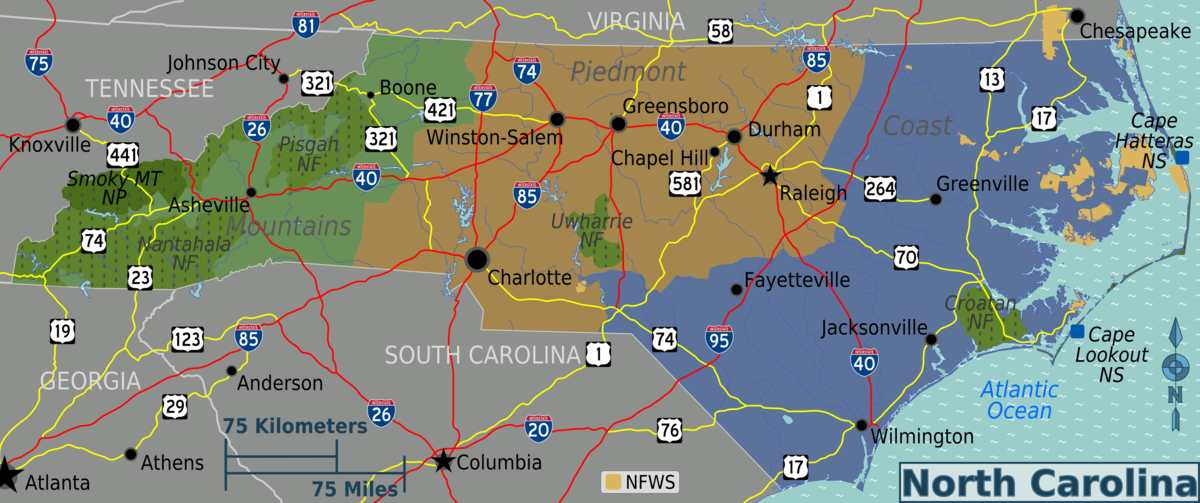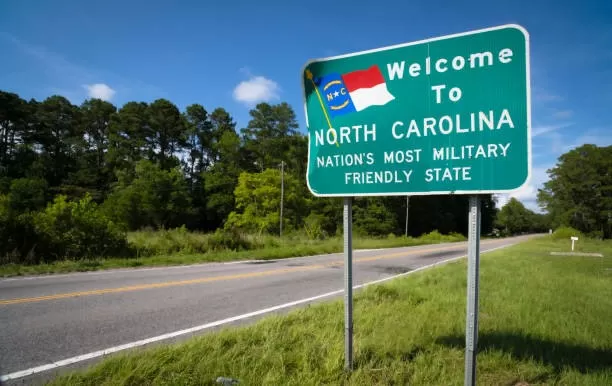North Carolina is one of the most stunning places in the United States. North Carolina, originally one of the 13 American colonies, is a historically and culturally rich southeastern state with nature's beauty in abundance. Famed for its varied landscapes, which range from its Atlantic Ocean coastline to the Appalachian Mountains, it has been an important part of America's history since colonial days through the present age. It is now a dynamic state with a robust economy, centers of education, and an amalgamation of tradition and progress. North Carolina is located in the southeastern region of the United States, bordered by Virginia, South Carolina, Georgia, Tennessee west, and the Atlantic Ocean.

Check Out: Harvard University vs The Trump Government: Latest Issues Explained
Important Details
| Category | Information |
| Capital | Raleigh |
| Largest City | Charlotte |
| Area | Approximately 53,819 square miles |
| Population | Around 10.8 million |
| Time Zone | Eastern Standard Time (EST) |
| Nickname | The Tar Heel State |
| State Motto | Esse quam videri ("To be, rather than to seem") |
| Major University | Duke University, UNC-Chapel Hill, and North Carolina State |
| Statehood | Became the 12th State in 1789 |
| Famous Residents | Michael Jordan, Ava Gardner, Nina Simone |
Historical Background
Let’s look at the overview of the history of North Carolina since its beginning as a tribe up to its modern revolution. It is divided over a span of the native period, the settlement of Europeans, the division between North and South Carolina, the Revolutionary War era, the Civil War, and the modern era.
- Native American Period
North Carolina was inhabited by the Cherokee, Tuscarora, and Catawba which are Native American tribes, before European settlement. The economy of these Native American tribes was built on the foundations of agriculture, hunting, and trade.
- European Settlement
It was at Roanoke Island in 1587 where the English tried to establish their settlement. It is now referred to as the “Lost Colony” because of its vanishing act under mysterious circumstances. King Charles bestowed this region as part of the Province of Carolina in 1663.
- Division into North and South Carolina
Due to governance challenges and regional differences, it was in the year 1712 that Carolina was split into North and South Carolina
- Revolutionary War Era
North Carolina played an active role in the American Revolution. It was the first colony to vote for independence from Britain at the 1776 Halifax Resolves. In 1789, it became the 12th state to ratify the U.S. Constitution.
- Civil War
During the Civil War in 1861, North Carolina joined the Confederacy. It was a significant battleground and suffered economic and social disruption. After the war, it underwent Reconstruction, like other Southern states.
- Modern Era
Today, North Carolina is known for its economic growth, cultural contributions, particularly in music, literature, and cuisine, and political significance as a swing state. Its cities continue to grow, and its natural beauty remains a draw for tourism and recreation.
Economy of North Carolina

The economy of North Carolina is one of the most diverse in the southeastern United States. Historically rooted in agriculture and manufacturing, the state has evolved into a hub for technology, finance, biotechnology, and education.
Here is a breakdown of its key economic sectors and characteristics:
1. Agriculture
North Carolina continues to be a top agricultural state, producing a large amount of goods. It is a leading producer of tobacco, which was once its most famous crop, along with poultry and eggs, and hogs. The state is also the number one producer of sweet potatoes in the entire U.S. Additionally, North Carolina grows significant amounts of cotton, soybeans, and corn. These farms are located all over the rural areas of the state, especially in the flat, eastern Coastal Plain region.
2. Manufacturing
Manufacturing has always been a key part of North Carolina's economy. The state has been particularly strong in textiles and apparel, though this area has become smaller over time because companies moved their production to other countries. Furniture making is another big industry, with cities like High Point even being known as the "Furniture Capital of the World." Beyond that, North Carolina is also a significant producer of pharmaceuticals and chemicals, as well as automotive and machinery parts.
3. Finance and Banking
Manufacturing has always been a key part of North Carolina's economy, especially in areas like textiles and apparel, though this has declined due to companies moving production overseas. The state is also well-known for furniture making, with cities like High Point even being called the "Furniture Capital of the World." Beyond these, North Carolina is a significant producer of pharmaceuticals and chemicals, as well as automotive and machinery parts.
4. Education and Healthcare
These sectors also play a crucial role, especially in urban areas. Major hospitals and medical research centers attract both investment and employment. The University of North Carolina System and Duke University are also economic engines due to their role in research and innovation.
Population
North Carolina has about 10.9 million people living in it. This makes it the ninth biggest state in the United States by population. Over the last ten years, more and more people have moved there. This is mostly because of good job opportunities, a fairly low cost of living, and nice weather.
Big cities in North Carolina, like Charlotte, Raleigh, which is the capital, Greensboro, and Durham, have all seen many new residents moving in from other parts of the country. This growth is especially strong because of jobs in technology, healthcare, and education, particularly in the Research Triangle area, which includes Raleigh, Durham, and Chapel Hill.
The state has a mix of city areas and countryside. Its people include a large African American population, along with growing Hispanic and Asian communities. This is making the state's society even more multicultural. With all this growth, North Carolina has both good chances and tough problems. For example, it needs to build more roads, houses, and public services to keep up with its growing population.
Healthcare
North Carolina's healthcare system has really improved lately, mostly because the state made Medicaid available to more people. This change meant hundreds of thousands of adults with lower incomes could get health insurance, many of whom had no coverage before.
Now, more people can go to the doctor, get their medicines, and receive care to stay healthy. The state even received extra money from the federal government for this Medicaid expansion. This money was then used to boost mental health services, make emergency help better, and provide care for communities that needed it the most.
Fun Facts About North Carolina
- Birthplace of Aviation: The Wright brothers made the first successful powered flight in Kitty Hawk in 1903.
- Pepsi Was Born Here: Pepsi-Cola was invented in New Bern in 1893 by Caleb Bradham.
- Biltmore Estate: Located in Asheville, it’s the largest privately-owned home in the U.S. with 250 rooms.
- Outer Banks Legends: The Outer Banks are famous for pirate Blackbeard, who was killed near Ocracoke in 1718.
- Mountains to Coast: You can visit both the Appalachian Mountains and Atlantic beaches in the same state.
- Venus Flytrap’s Natural Home: These carnivorous plants grow natively only in a 60-mile radius of Wilmington.
- Cheerwine & Bojangles: Two beloved North Carolina-born treats are a cherry soda and a fried chicken chain.
- Bluegrass Roots: It’s a hub for bluegrass and old-time music, especially in the Appalachian region.
Must Read
